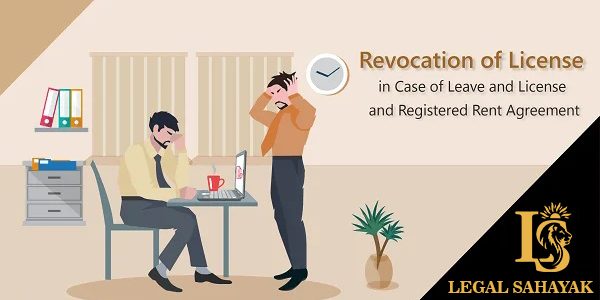Revocation of Leave and License Agreement
What is a leave and license?
A leave and license is granted by the grantor for an immovable property. It is a personal right and does not gives the permissive right. It does not create any duties and obligations upon the persons involved in the process of making the grant. Therefore, the license granted has no other effect to confer the liberty.
Section 52 of Indian Easement Act, 1882 defines leave and license as under: Where one person grants to another, or to a definite number of other persons, a right to do or continue to do, in or upon immovable property of the grantor, something which would, in the absence of such rights, be unlawful and such right does not amount to an easement or an interest in the property, the right is called a license.
A leave and license agreement is distinct from a lease agreement. If the grantee gets an exclusive right of possession through the certain reservation, it shall be deemed to be a lease and not a license. This means that the grantee can only use the property in a certain way. The property will still remain in the possession and control of the owner. However, a lessee can bring an action for trespass. A lease deed or rental agreement is a contract where lessee agrees to pay rent to the lessor for the use of the immovable property. The registration for the leave and license agreement can be done online through e-registration. Online registration of rent agreement can be done by:
- Draft a leave and license agreement and review with the parties involved.
- Purchase e-stamp paper.
- The date for the Sub-registrar office will be provided for the registration of lease.
- Government registration fees have to be paid.
- The registration process is facilitated at the registrar’s office.
- Collection of the final registered lease deed can be done from the Sub-registrar office.
Therefore, a leave and license agreement is a privilege to do something on that premise, which would otherwise be unlawful. Whether a transaction amounts to a lease or a license depends upon the intention of the parties involved in it and whether the exclusive possession had been given or not.
Leave and License Laws
A few points on leave and license laws are important to note:
- A license does not gives an exclusive interest in the property.
- A license is a personal right and cannot be assigned or transferred.
- A license is revocable with exceptions in cases mentioned in the Indian Easement Act, 1882.
In general, the license is always revocable at the will of the licensor. This means the cancellation of the license can be done if the licensor wants to do so. However, there are 2 restrictions imposed B section 60 of the Indian Easement Act, 1882:
- If the license is coupled with the transfer of the property. If such a license exists, it acts as a contract, gift or a grant. As such transfer is in force, it becomes irrevocable.
- If the licensee is acting upon the license.
The fact the license was granted for an agreed period of time cannot affect the revocability of bare license.
Cancellation policy of leave and license
As per the terms and conditions laid in the leave and license agreement, the license can default in case the fees remain unpaid. Licensor retains its right to terminate the agreement binding upon the licensee and the licensor, by issuing him a notice. Once the leave and license agreement is executed it has to be approved by the sub-registrar. There are four ways of cancellation or termination of leave and license agreements:
- Automatic Termination: The agreement that is automatically terminated after the end of the leave and license period is referred as automatic termination.
- Notice by either party: A standard clause of termination available in every leave and license agreement. The method of cancellation is applicable when the agreement is terminated before of the leave and license period.
- New registered rent agreement: In case a new leave and license agreement are executed within the same lease period, for the same property, the old leave and license agreement is terminated or cancelled.
- Registration of cancellation deed: This process involves payment of stamp duty and registration fees to the government, submission of the same to the register office, and the collection of the executed deed from the sub-registrar office by the approval of final stamp by the sub-registrar.
Cancellation process of leave and license
The first three ways of cancellation of leave and license agreements do not require any legal fees. However, the fourth requires mandatory payment of Stamp Duty and registration fees. It is totally the discretion of the parties involved in the agreement to choose the method or leave and license cancellation process. All the clauses have to be terminated for more secured understanding with the approval of Government of India.
Any leave and license statement does not reveal if it is a transaction or a legal relationship. It may or may not be revocable. Revocation of license in case of leave and license agreement may be a transaction, may be unwritten, or unsealed, or couched terms. It may also be designed for the special purpose. Legal consequences for every circumstance may very. There is the usage of the term license to signify a transaction. This usage is generally done by a layman who thinks it in terms of jural relations. The simple rationalization of license cases by the ambiguous usage of the term license is done to signify a transaction and sometimes, a relationship.
Are you Looking for Leave & License or Registration Rent Agreement?
Legal Sahayak will guide you for Leave and License or Registered Rent Agreement, Please click on the following link to connect with our consultants.
Apply for Registered Rent Agreement







